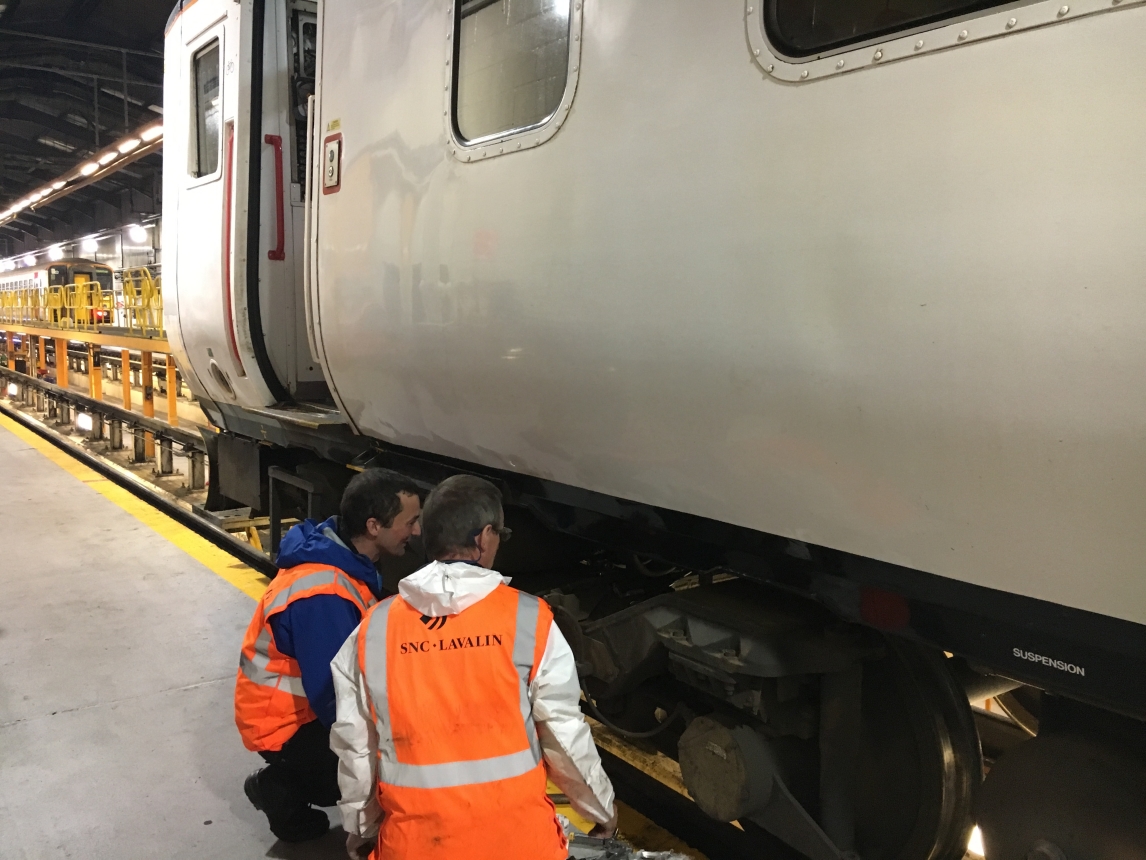Published on: Thursday, 15 June 2017
Last updated: Thursday, 14 December 2017
An innovative new train braking system – like ABS in cars – is being fitted to Greater Anglia’s rural trains to greatly improve reliability, especially during the autumn.
Greater Anglia’s award-winning engineering department is fitting the new system to Class 156 trains which operate on rural services in Norfolk, Suffolk and Essex, in partnership with the train owners, Porterbrook, and the system’s designers, SNC-Lavalin, KBRS and Loram UK Ltd.
This is the first time such a system – known in the industry as ‘Wheel Slide Protection’ (or WSP) – has been designed for Class 156 trains and has been a two-year process from the initial concept and design stage, building and installing a prototype on a Greater Anglia’s Class 156 train.
Wheel Slide Protection is a braking system like ABS on a car which uses technology installed on the train to judge whether its wheels are slowing evenly when the train brakes. When the wheels do not brake evenly this can cause damage to the wheel, known as a ‘wheel flat’.
Wheel flats must be removed on a wheel lathe, which returns the train wheel to a perfect circle again. This can involve the train being out of service for up to a week.
If several trains suffer from wheel flats at the same time, which can occur in adverse weather conditions particularly during the Autumn, this can lead to disruption to passengers through a shortage of trains meaning that some services are cancelled.
Greater Anglia hopes that by installing WSP on its Class 156 trains (it is already installed on other types of train in its fleet), the number of rural services cancelled due to wheel flats will be drastically reduced.
The prototype Class 156 has been in operation since October 2016, through Autumn and adverse weather – including on the Marks Tey – Sudbury line where in 2015 many services were cancelled due to wheel flats caused by rails made slippery by fallen leaves.
Six months later, the train’s wheels are all still in good condition. None of its wheels have needed to visit the wheel lathe, whereas other Class 156 trains will have received treatment from the wheel lathe two or three times during the same period.
Greater Anglia’s Norwich Depot Technical Manager, Jason Mills, said, “We are absolutely delighted with the results. This is an industry first and a brilliant innovation by the teams at Norwich Crown Point, Porterbrook, KBRS, SNC-Lavalin and Loram UK Ltd, taking a class of train that some thought incompatible with WSP and creating a bespoke system that has surpassed everyone’s expectations. This investment means that these trains will be more reliable as they will not need to be taken out of service as often to visit the wheel lathe, and is a further investment to improve our passengers’ experience while we await the roll out of new trains from 2019.”
Following on the success of the first Class 156 train to benefit from WSP, engineers are making final adjustments and improvements to the system. It will then be rolled out to Greater Anglia’s remaining eight Class 156 trains over six weeks from the summer, in time for Autumn which is traditionally when these trains have suffered with wheel flat issues.
Porterbrook’s Fleet & Standards Director, Neil Foster, said, “Porterbrook was confident that WSP could be retrospectively fitted to Class 156 trains, but the performance of last Autumn’s WSP trial surpassed everyone’s expectations. It was only possible to deliver the trial in time to experience last autumn through a collaborative approach between all stakeholders. Porterbrook is really pleased to be supporting Greater Anglia in the fitment of WSP across its whole 156 fleet and ultimately we hope that WSP will be more widely adopted across the UK’s Class 150, 153, 155 &156 fleets if there is industry support for this”.
The programme will see an additional eight-12 engineers employed under contract to SNC-Lavalin who will carry out the work at Norwich Crown Point Depot.



